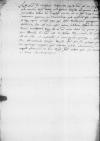Letter #2144
[Ioannes DANTISCUS] to [Paweł PŁOTOWSKI]Heilsberg (Lidzbark Warmiński), 1539-05-06
English register:
The addressee’s brother [Mikołaj Płotowski] has informed Dantiscus of the content of the letter he received from the addressee.
Dantiscus writes that many days ago, in connection with the plague prevailing in Marienburg (Malbork), upon the Prussian lords’ request he sent a letter to the King [Sigismund I Jagiellon] requesting that he move the time of the [Royal Prussian] Diet to after Pentecost and that he allow the members of the Prussian Council to choose the location. Until the King’s reply arrives, there is no need for the addressee to come at the previously agreed time.
When the addressee comes to see Dantiscus, he will receive gout medicine from him.
Manuscript sources:
Auxiliary sources:
Prints:
| ||||||||||
Text & apparatus & commentaryPlain textText & commentaryText & apparatus
Venerabilis Domine, frater carissime.
Salutem.
Ea, quae Dominatio Vestra
Quod Dominatio Vestra pro sua podagra pet[it], hic apud me accipiet. Quam libenter videbo advenientique non negabo pharmacum Dominationi Vestrae.
Quam feliciter valere opto.
